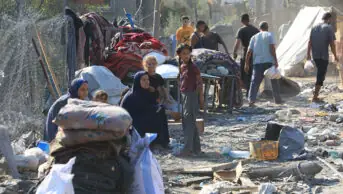World Pharmacist Day, led globally and yearly by the International Pharmaceutical Federation (FIP) on 25 September, is an opportunity to recognise the essential role pharmacists play in healthcare. The theme for 2024 is ‘Pharmacists: meeting global health needs’. Here, three pharmacists who have worked together at UK Health Security Agency share examples of how they meet global health needs and their top tips for getting involved.
Pharmacy is a versatile profession, yet there are few dedicated pathways for pharmacists in global health, despite the expertise pharmacists could contribute. We hope this letter inspires you on World Pharmacist Day to diversify while retaining your core pharmacy practice.
What is global health? In 2010, Robert Beaglehole and Ruth Bonita proposed that “global health is collaborative trans-national research and action for promoting health for all”. They specified that global health focuses on issues that transcend national boundaries, even though the effects of global health issues are experienced within countries. Trans-national action was proposed as requiring the involvement of more than two countries, with at least one outside the traditional regional groupings.
We have varied global health roles and opportunities, including:
- Using medicines knowledge to provide clinical pharmacy services and humanitarian aid around the world;
- Leading on health policy and advocacy to strengthen global emergency preparedness, resilience and response;
- Developing, implementing and evaluating antimicrobial stewardship programme across multiple countries (e.g. the Commonwealth Partnerships for Antimicrobial Stewardship (2018–2022) and contributing to global policy through WHO AMS policy guidance);
- Collaborating on research activities in multiple countries;
- Mentoring pharmacists across the world or leading professional networks such as the European Society of Clinical Microbiology and Infectious Diseases (ESCMID) Study Group for Antimicrobial Stewardship (ESGAP) and the Africa Special Interest Group of the Faculty of Public Health.
Our top tips if interested in global health:
Understanding cultural contexts is crucial for maximum impact. Most global health organisations require international experience and cross-cultural working. Volunteering with organisations such as the Commonwealth Pharmacists Association or FIP, or with humanitarian groups such as Doctors of the World, Médecins Sans Frontières and Save the Children, can provide valuable experience. There are projects focused on different health aspects, including non-communicable diseases, infections, migrant health and the impact of climate change.
Consider applying for fellowships, such as NHS England’s ‘Global Health Fellowship’ and the chief pharmaceutical officer’s ‘Global Health Fellowship’.
Others include the Commonwealth Fund’s ‘Harkness Fellowship in Healthcare Policy and Practice‘ and ‘The Churchill Fellowship‘. If interested in Global Health courses, there are several open university online short courses (FutureLearn, OpenLearn, Coursera) and Global or Public Health Master degrees.
Go for it, reach out to colleagues who are involved in global health; ask questions, test the waters of global collaboration and get involved.
We invite colleagues to comment with further examples and to share their top tips.
Fatima Abba, senior programme officer, global health security and pandemic preparedness advocacy, Bill & Melinda Gates Foundation;
Diane Ashiru-Oredope: lead pharmacist for healthcare-associated infections, fungal, AMR, AMU and sepsis division at the UK Health Security Agency; deputy chief scientist at the Royal Pharmaceutical Society; and honorary chair and professor of pharmaceutical public health at the University of Nottingham;
Eleanor Harvey, project pharmacy Manager, Médecins Sans Frontières; and critical care and theatres pharmacist at the North Bristol NHS Trust.


